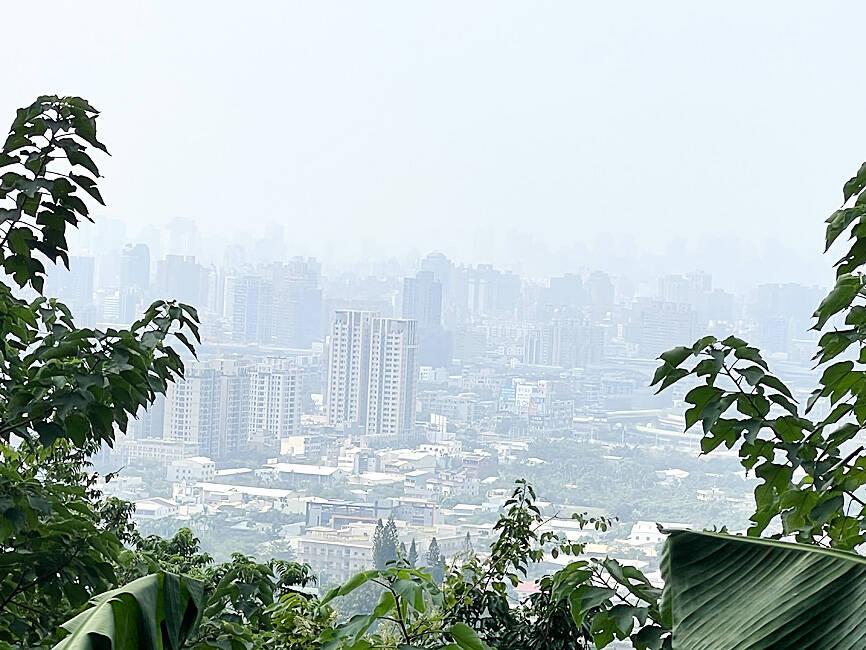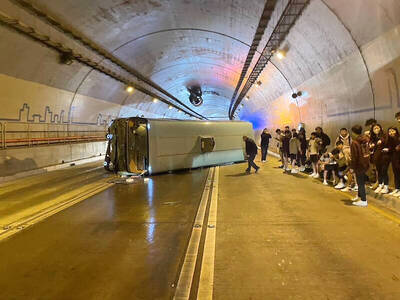A new white paper on air quality, which is expected to be released by the end of March next year at the earliest, is to encompass public suggestions, the Ministry of Environment said today at a news conference to discuss the paper.
The paper would serve as the foundation for developing the third phase of air pollution control policies, to be implemented from 2028 to 2031.
The paper is to integrate public demands for air quality, enhance communication and openly address public concerns, Department of Atmospheric Environment head Chang Shun-chin (張順欽) said.

Photo: Liao Yao-tung, Taipei Times
It would draw on international experience, incorporate emerging technologies and research to strengthen the science behind air quality policies and enhance international cooperation as well as domestic research, Chang said.
The ministry would establish a platform to consolidate public suggestions about Taiwan’s air quality starting on Jan. 8, creating a “good air wish list,” Chang said.
It would then hold a public forum before the Lunar New Year holiday to discuss the suggestions, he said.
The ministry is also holding a forum on sustainable clean air technology from Feb. 24 to 26, consolidating advice from experts and the public before publishing the white paper in March, he added.
The wish list encompasses four major aspects: improving air pollution from factories, vehicles and daily activities; reducing pollution and enhancing benefits under the net-zero transition; the impact of air pollutants, air-quality modeling and monitoring data; and strengthening the management of harmful pollutants, Chang said.
The influence of weather on air quality is a key aspect, but Taiwan has some of the least predictable weather in the world, said Lai Hsin-chih (賴信志), a professor of green energy and environmental resources at Chang Jung Christian University.
Europe and the US’ air quality regulations have a complete set of tools, encompassing climate and emissions, to set a timeline to achieve their goals, he said.
Only by designing a common scientific platform and using common tools would Taiwan be able to stand together and discuss how to improve the nation’s air quality, he said.
The results of NASA’s Kaohsiung-Pingtung 3D Air Quality Experiment (KPEx) revealed new insights that could serve as the basis for the third phase of air pollution control policies and determine how much air pollution could be reduced, said Lin Neng-huei (林能暉), a professor of atmospheric sciences at National Central University.
The second phase of the air pollution control plan, which runs from this year to 2027, sets a goal for the national average of PM2.5 concentration to reach 13μg/m³ by 2027, with an additional target of 12μg/m³ by 2030.
Considering that air quality issues persist in central and southern Taiwan during certain seasons, the target for these regions has been set to 15μg/m³.
Another goal of the plan is to reduce the national number of eight-hour ozone red alert days by 80 percent compared to 2019 levels.

“China is preparing to invade Taiwan,” Deputy Minister of Foreign Affairs Francois Wu (吳志中) said in an exclusive interview with British media channel Sky News for a special report titled, “Is Taiwan ready for a Chinese invasion?” the Ministry of Foreign Affairs said today in a statement. The 25-minute-long special report by Helen Ann-Smith released yesterday saw Sky News travel to Penghu, Taoyuan and Taipei to discuss the possibility of a Chinese invasion and how Taiwan is preparing for an attack. The film observed emergency response drills, interviewed baseball fans at the Taipei Dome on their views of US President

The Central Weather Administration (CWA) today issued a "tsunami watch" alert after a magnitude 8.7 earthquake struck off the Kamchatka Peninsula in northeastern Russia earlier in the morning. The quake struck off the east coast of the Kamchatka Peninsula at 7:25am (Taiwan time) at a depth of about 19km, the CWA said, citing figures from the Pacific Tsunami Warning Center. The CWA's Seismological Center said preliminary assessments indicate that a tsunami could reach Taiwan's coastal areas by 1:18pm today. The CWA urged residents along the coast to stay alert and take necessary precautions as waves as high as 1m could hit the southeastern

The National Museum of Taiwan Literature is next month to hold an exhibition in Osaka, Japan, showcasing the rich and unique history of Taiwanese folklore and literature. The exhibition, which is to run from Aug. 10 to Aug. 20 at the city’s Central Public Hall, is part of the “We Taiwan” at Expo 2025 series, highlighting Taiwan’s cultural ties with the international community, National Museum of Taiwan Literature director Chen Ying-fang (陳瑩芳) said. Folklore and literature, among Taiwan’s richest cultural heritages, naturally deserve a central place in the global dialogue, Chen said. Taiwan’s folklore would be immediately apparent at the entrance of the

Speeding and badly maintained roads were the main causes of a school bus accident on a rainy day in Taipei last year that severely injured two people and left 22 with minor injuries, the Taiwan Transportation and Safety Board said. On March 11 last year, a Kang Chiao International School bus overturned inside the Wenshan Tunnel (文山隧道) on the northbound lane of the Xinyi Expressway. The tour bus, owned by Long Lai Co, exceeded the speed limit after entering the tunnel, the board’s investigation found. Sensing that the rear of the vehicle was swaying, the driver attempted to use the service and exhaust